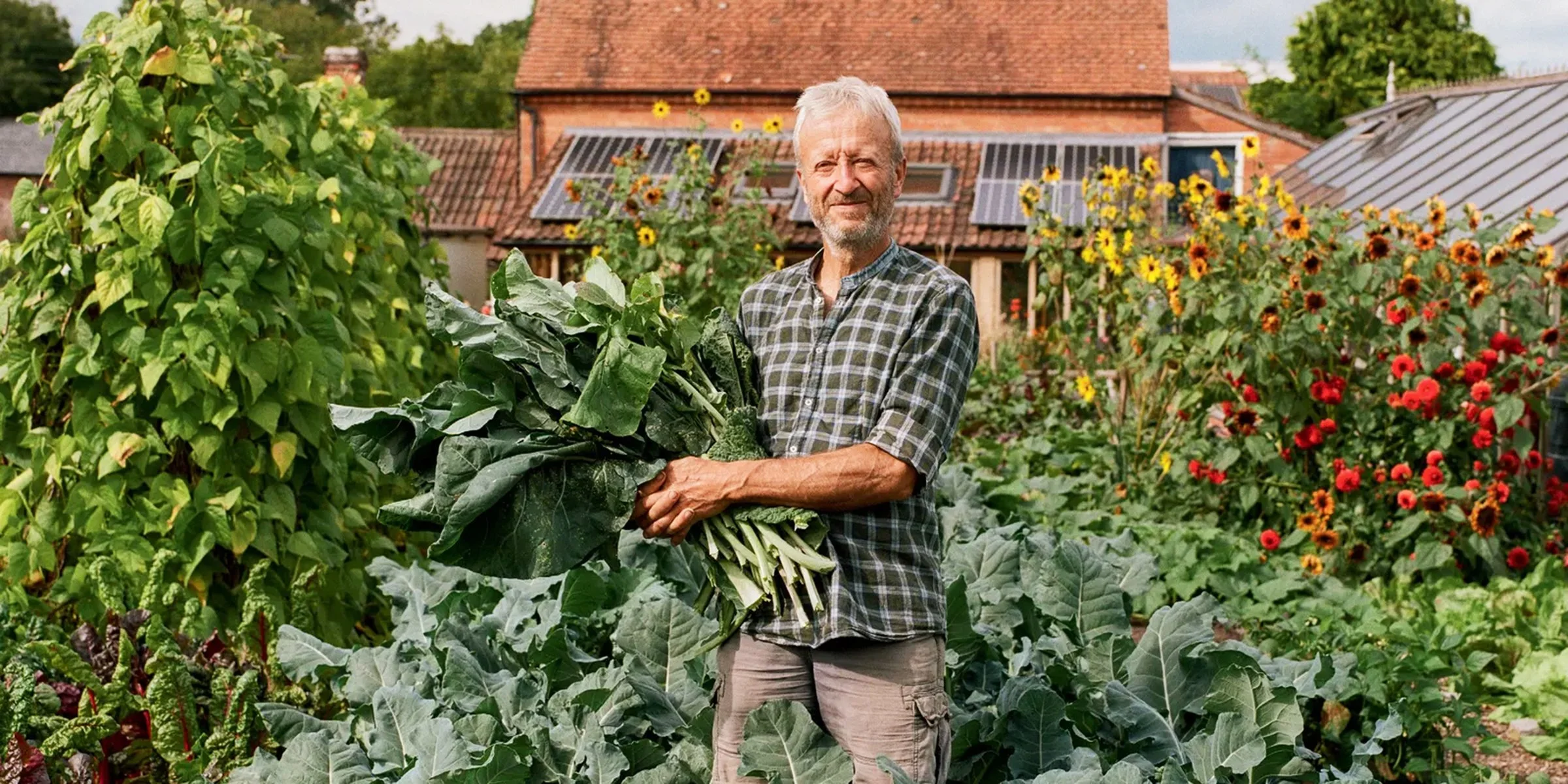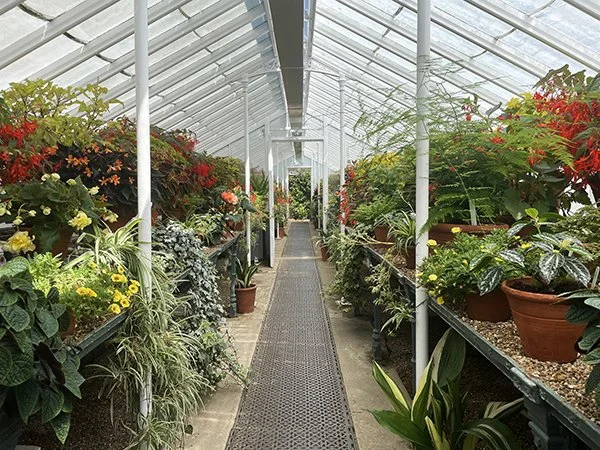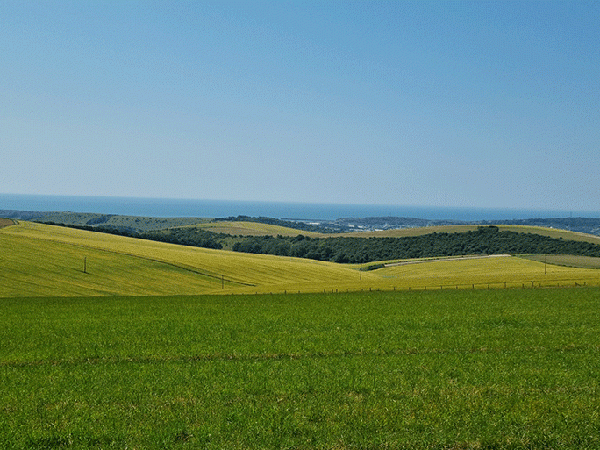
Cutting Edge
2610 | 3 to 10 September | 8 days | maximum number 10
Avebury Manor & Stone Circle, Hauser & Wirth, Heal Somerset, the Walled Garden at Mells, Homeacres, Muriel Jones Field Allotments, Gilbert White’s House & Garden, Weald & Waves walk, Wakehurst Place & Millennium Seed Bank, Petworth Community Gardens, Arundel Castle, West Dean, One Garden Brighton, Knepp Estate Safari, RHS Garden Wisley and more…
Welcome to the Cutting Edge, welcome to the future…
This exciting new tour explores gardening and horticulture in the face of climate change, habitat loss, wildlife depletion and soil degradation. We look at what can be done, what is being done – and visit people and communities doing it.
This is the most exciting new tour we have developed for some years, and we have discovered gardens, organisations and community associations hiding in plain sight. We look at the importance of community gardens, the link between well-being and gardening, soil health and sustainability, and what changes we can make, as gardeners, to benefit wildlife. We visit Charles Dowding, the doyen of the no-dig revolution, at his smallholding, Homeacres, and enjoy a guided walking safari at the Knepp Estate, the forerunners of large-scale rewilding in Britain.
We visit established, traditional gardens, too. We stay in two very comfortable inns, The Holcombe, in Somerset, and The Spread Eagle Hotel, in Sussex, and we eat especially well.
Walking
Please note that the tour includes two 2-hour guided walking safaris across rough farmland and one longer walk on the South Downs, upland chalk pasture.
Please see the Additional Information, below the tour map, for more information on accommodation and eateries.
Prices
Per person, sharing
3,450 GBP | 4,830 USD | 3.795 EUR
Prices are per person, sharing a double or twin room
Per person, single occupancy
3,975 GBP | 5,565 USD | 4.370 EUR
Prices are per person, for the single occupancy of one room
Prices, reservations & payments
Please read the Booking & Paying page and the comments in the additional information, below.
BOOK PLACES ON THIS TOUR
EXPRESS INTEREST & HOLD PLACES ON THIS TOUR
ASK QUESTIONS ABOUT THIS TOUR
Itinerary
Scroll down for additional information – maps of the tour area, hotels, eating etc.
D1 Thursday, 3 September
Avebury Manor, Stone Circle & Henge
Avebury Manor & Stone Circle
Tim will meet you at the Sheraton Heathrow Hotel, just north of Terminal 5, Heathrow Airport, at 10:00, and once we’ve loaded the minibus, we’ll head west to Somerset, stopping halfway, for lunch at Avebury.
Avebury, an otherwise unassuming Wiltshire village, is home to Avebury Henge, the largest stone circle in the world and one of the greatest marvels of prehistoric Britain, and Avebury Manor, where we’ll explore its garden.
We’ll have time to explore most of what Avebury has to offer, including the henge, and have time for lunch before continuing west to The Holcombe, our home for the next three nights, where we plan to be late afternoon, in good time to check in and relax before drinks and dinner at The Holcombe.
Today's driving is about 100 miles/160 km
D2 Friday, 4 September
The Oudolf Field, Hauser & Wirth
Hauser & Wirth and Heal Somerset
We spend the day at two very different places, starting with a morning visit to Hauser & Wirth Somerset, a former farmstead transformed into a gallery and arts centre, exhibition space and much more. Behind the gallery, there is Oudolf Field, a Piet Oudolf-designed landscape, with sculptures and a pavilion designed by Smiljan Radić. There’s also Da Costa, an on-site restaurant, where we’ll have lunch, and Farm Shop, stocking local produce.
After lunch, we visit Heal Somerset for a guided walking tour of this infant rewilding site, which only began its recovery from its ecologically depleted state in early 2023.
Our final visit is to Frome, a busy market town, which we’ll have time to explore before dinner at Bistro Lotte in the town centre.
Today's driving is about 50 miles/80 km
D3 Saturday, 5 September
The Walled Garden at Mells
Mells & Homeacres
We start the day with either Alan or Caroline, the owners of The Holcombe, in their kitchen garden, talking about their journey to Holcombe and their values regarding sustainability, waste and food. We leave Holcombe to visit The Walled Garden at Mells, an ancient and enchanted Walled Garden in the heart of the village, for lunch and to explore the garden, its nursery and shop.
This afternoon is one of the tour’s highlights, a guided talk by Charles Dowding at his home and smallholding, Homeaces. Charles’ avowed focus has been to grow healthy and health-giving food, and we learn something about him, his passion and the techniques and guiding principles of no-dig gardening.
We return to The Holcolmbe for dinner.
Today's driving is about 50 miles/80 km

Charles Dowding, no-dig pioneer…
Charles Dowding is a pioneer of no-dig gardening. Instead of preparing vegetable beds the traditional way, by digging and turning the soil, he advocates minimal soil disturbance and generous use of compost and mulches – this results in less weeding, improved soil health and structure, and increased moisture retention.
Charles is from a farming family and has been running market gardens since the early 1980s. In November 2012, he moved to Homeacres, an overgrown small holding, and turned it into a highly productive no-dig garden. He is the author of 14 books, is very active on social media, and lectures at home and abroad.
In short, by promoting more sustainable gardening and focusing on soil health, he has been instrumental in changing traditional attitudes in the way we garden.
D4 Sunday, 6 September
Gilbert White’s garden
Frome Allotments & Gilbert White’s
We leave The Holcombe to visit the Muriel Jones Fields, the largest of the eight community allotments run by the Frome Allotment Association, to meet one of the organising committee and get an understanding of the importance of community gardening in this part of Somerset.
Late morning, we’ll set off east, to Sussex, stopping at Gilbert White’s House & Garden for lunch and to explore the home and garden of this 18th-century writer and naturalist, whose book, The Natural History of Selborne, published in 1789, has never been out of print.
We plan to arrive at The Spread Eagle, our home for the next four nights, in the late afternoon, in good time to check in and relax before drinks and dinner at the hotel.
Today's total driving is about 100 miles/160 km
D5 Monday, 7 September
Millennium Seed Bank, Wakehurst Place
Weald to Wave & Wakehurst Place
Armed with day packs and walking boots, we set off to the South Downs to meet one of the project managers of Weald to Waves, a network of farmers, wildlife charities and community groups, who, together, are establishing a nature recovery corridor from the High Weald to the Sussex coast. We plan to have a guided walk along part of this corridor, from Bishopstone to The Ram Inn, Firle, where we’ll have lunch.
We’ll spend the afternoon at Wakehurst Place, Kew Gardens’ place in the country, for a guided tour of the Millennium Seed Bank, home to over 2.5 billion seeds from more than 40,000 different plant species, representing almost 100 countries.
Dinner is at The Merry Harriers, a fantastic pub, on our way home.
Today's driving is about 120 miles/190 km

The Knepp Estate, rewilding pioneers…
Knepp Estate was the first major lowland rewilding project in England. It comprises some 3,500 acres of former arable and dairy farmland in West Sussex. Like hundreds of other British farms, the Knepp Estate was an unexceptional dairy and arable farm, but all that changed when its owners, Charlie Burrell and Isabella Tree, realised that conventional farming was no longer viable on their poor soils.
Today, the estate is a mosaic of woodland, scrubland, pasture and wetland, home to free-roaming Longhorn cattle, Exmoor ponies, Tamworth pigs and Red and Fallow deer, all contributing to habitat regeneration. The estate has witnessed an 'extraordinary abundance' of many rare species, including turtle doves, barbastelle bats, slow-worms and grass snakes, and is now a breeding hotspot for purple emperor butterflies and nightingales. Remarkably, Knepp now has a colony of breeding Storks, the first breeding population in Britain since 1416!
D6 Tuesday, 8 September
Victorian Glasshouses, West Dean
Petworth, Arundel & West Dean
We stay close to home today, starting with a visit to Petworth Community Garden, again, to understand the importance of gardening within the community.
And then to Arundel Castle, the ancestral seat of the Dukes of Norfolk and one of the largest inhabited castles in England, where we’ll explore both the castle and its magnificent gardens and Arundel itself.
Our final visit is to West Dean, to explore its Walled Garden and impressive range of Victorian Glasshouses.
Dinner is literally around the corner at The Royal Oak Inn, East Lavant, en route home.
Today's driving is about 60 miles/100 km
D7 Wednesday, 9 September
Long Horn Cattle, Knepp Easte
Stanmer & Knepp Estate
Our final full day of the tour starts in Stanmer, on the northern edge of Brighton, with the One Garden, a community garden focused on future sustainability. Adjacent to this is Stanmer Wellbeing Gardens, part of the Brighton & Hove Food Partnership, and next to that is Stanmer Organics, a co-operative promoting health and greener, more sustainable lifestyles.
After lunch, at Stanmer Tea Rooms, we head north to the Knepp Estate for an afternoon’s guided walking safari – possibly the highlight of the whole tour.
We return, tired but energised, to The Spread Eagle for a relaxing evening and our end of tour dinner.
Today's driving is about 60 miles/100 km
D8 Thursday, 10 September
World Food Garden, RHS Wisley
RHS Garden Wisley
Our final visit is to RHS Garden Wisley, the HQ and flagship garden of the RHS and the lead practitioner of planet-friendly gardening and environmentally conscious living. It has committed itself to becoming net positive for nature and people.
We will have plenty of time to explore these internationally renowned gardens before returning to the Sheraton Heathrow Hotel, where the tour ends, by about 14:30/2 pm.
If you are staying in the UK and don't need, or wish, to return to London or Heathrow, then please let us know your onward travel plans, so that we may assist you in getting to your next destination.
Today's driving is about 60 miles/100 km
Additional information
Tour area map
Our hotels
We stay at two hotels, The Holcombe, a food-focused family-run dining pub in Somerset, for the first three nights, and The Spread Eagle, a historic coaching inn, in Sussex, our recently discovered favourite hotel, for the second four nights.
Eateries
We will dine in on the first and last evening at each of our two hotels, and dine out at the Bistro Lotte in Frome, the Merry Harriers in the Surrey Hills at Hambledon, and The Royal Oak Inn in East Lavant.
Walking
We plan to have two 2-hour guided walking safaris, one at Heal Somerset and one at Knepp Estate, and one longer walk on the South Downs.
The South Downs walk, in particular, is hill walking on upland chalk downs and will require walking boots.
Bedrooms & upgrades
Generally, we book a hotel’s standard rooms for our groups, although these may vary from room to room within the hotel.
Single travellers
Single travellers will have their own room, typically a small double room or, occasionally, a twin room.
Upgrades
If you would like to upgrade your room, please look at the hotel’s website and then contact us with your request.
Please do not contact the hotel directly.
The South Downs from Firle Beacon
Joining instructions
The meeting arrangements are outlined in Day 1 of the itinerary, above, and will be confirmed by email some 12 weeks before the tour starts.
NB. The hotels we use as meeting points are chosen because of their location, the ease of access for the minibus and because they afford our customers, whether staying there or not, a comfortable and secure place to wait.
It is not because we endorse the hotel.
Accuracy & faithfulness
When describing the tour, we try to be accurate and, when undertaking the tour, we try to be faithful to the itinerary. However, changes can occur, either necessarily or unavoidably, and we ask for your understanding when this happens.
Useful links
Click here for some useful links to other websites, notably tourism, heritage, horticultural, cultural organisations and travel and transport websites.
Please let us know if any links are dysfunctional.
Acknowledgements
Finally, we would like to acknowledge the assistance of the many guide books and websites we use in planning our tours.
Thank you.








